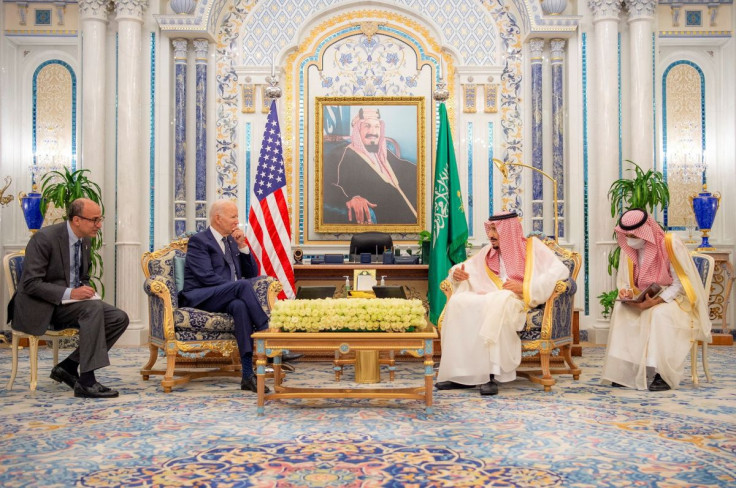Biden Reassures Arab Leaders U.S. Committed To Region

President Joe Biden told an Arab Summit on Saturday that the United States would remain firmly committed to its allies in the Middle East and was "not going anywhere" as he lobbied for a regional security alliance that would integrate Israel.
Biden, who began his first trip to the Middle East as president with a visit to Israel, presented his vision and strategy for America's engagement in the Middle East.
He also sought to use the gathering in Jeddah to integrate Israel as part of a new axis largely driven by shared concerns over Iran.
"We believe there's great value in including as many of the capabilities in this region as possible and certainly Israel has significant air and missile defence capabilities, as they need to. But we're having these discussions bilaterally with these nations," a senior administration official told reporters.
Biden has focused on the planned summit with six Gulf states and Egypt, Jordan and Iraq, while downplaying a meeting with Saudi Crown Prince Mohammed bin Salman. That encounter drew criticism in the United States over human rights abuses.
"No country gets it right all the time, even most of the time, including the United States. But our people are our strength. Our countries with the confidence to learn from the mistakes grow stronger," Biden said.
"So let me conclude by summing all this up in one sentence. The United States is invested in building a positive future in the region, in partnership with all of you, and the United States is not going anywhere."
Biden had said he would make Saudi Arabia a "pariah" on the global stage over the 2018 murder of journalist Jamal Khashoggi by Saudi agents, but ultimately decided U.S. interests dictated a recalibration, not a rupture, in relations with the world's top oil exporter.
The U.S. leader said he had raised the Khashoggi killing with the Saudi crown prince on Friday and that to be silent on the issue of human rights is "inconsistent with who we are and who I am".
The crown prince told Biden that Saudi Arabia has acted to prevent a repeat of mistakes such as the killing of Khashoggi but that the United States had made similar mistakes, including in Iraq, a Saudi official said.
In a statement sent to Reuters about the two leaders' conversation on Friday, the official said the kingdom's de facto ruler had asserted that trying to impose certain values by force on other countries could backfire.
Biden needs the help of OPEC giant Saudi Arabia at a time of high crude prices and other problems related to the Russia-Ukraine conflict and as he encourages efforts to end the Yemen war, where a temporary truce is in place. Washington also wants to curb Iran's sway in the region and China's global influence.
FOOD SECURITY
During his meeting with Biden, Egyptian President Abdel Fattah al-Sisi discussed food security and disruptions to energy supplies, the Egyptian presidency said.
Relations between Egypt and the United States were uneasy in the first months of the Biden presidency amid differences on human rights, before Egypt's efforts to broker a ceasefire in Gaza in May 2021 prompted re-engagement.
A second senior administration official said Biden would announce that the United States has committed $1 billion in new near- and long-term food security assistance for the Middle East and North Africa, and that Gulf states would commit $3 billion over the next two years in projects that align with U.S. partnerships in global infrastructure and investment.
Gulf states, which have refused to side with the West against Russia over Ukraine, are seeking a concrete commitment from the United States to strategic ties that have been strained over perceived U.S. disengagement from the region.
Riyadh and Abu Dhabi have been frustrated by U.S. conditions on arms sales and at their exclusion from indirect U.S.-Iran talks on reviving a 2015 nuclear pact they see as flawed for not tackling regional concerns about Tehran's missile programme and behaviour.
Israel, which shares their concerns about Iran, encouraged Biden's trip to the kingdom, hoping it would foster a warming between Saudi Arabia and Israel as part of a wider Arab rapprochement after the UAE and Bahrain forged ties with Israel in U.S.-brokered pacts that received Riyadh's blessings.
Saudi Arabia said on Friday it would open its airspace to all air carriers, paving the way for more overflights to and from Israel.
A plan to connect air defence systems could be a hard sell for Arab states that do not have ties with Israel and balk at being part of an alliance seen as against Iran, which has built a strong network of proxies around the region including in Iraq, Lebanon and Yemen.
© Copyright Thomson Reuters 2024. All rights reserved.







